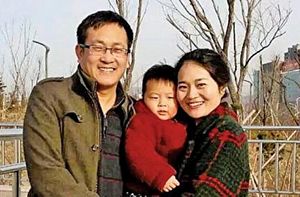Reluctant to allow released political prisoners to speak freely of their persecution, the People’s Republic of China (PRC) has developed diverse methods for assuring their continuing silence that can be conveniently encapsulated as the “Non-Release Release” (NRR). Wang Quanzhang, who was scheduled for release on April 5 after almost five years in prison, presented the party-state with a unique challenge because of his refusal to plead guilty to subversion charges and the attendant international publicity stoked in large part by his courageous wife. How would the PRC deal with this extraordinary couple?
Apparently uncertain how to respond, the authorities at first took advantage of the current COVID-19 crisis and imaginatively announced that Wang would have to be quarantined for 14 days after release from prison and confined in his former home in Shandong province rather than returned to his family in Beijing. But many observers waited to see what would happen on April 19. Would the party-state resort to one of its usual techniques? For example, would it allow him to reunite with his family in Beijing, but only after extracting their commitment to remain cut off from the world and organizing around-the-clock monitors to guarantee compliance? Instead, if Wang refuses to cooperate, would it secretly “disappear” him forever, out of contact even with his family?
Strange events since the end of Wang’s quarantine on Sunday suggest that his captors are still uncertain over his fate. Wang has not been allowed to return to Beijing, but he has been permitted to use an undoubtedly monitored mobile phone to talk with his wife. Moreover, on Monday he was permitted to go out for lunch with his charismatic friend, disbarred lawyer Xie Yang, who was earlier released from incommunicado imprisonment. And on Tuesday, Mimi Lau, an experienced journalist from the South China Morning Post, somehow managed to reach Wang by phone for his first media interview since his detention in 2015.
I would love to have been a fly on the wall at Wang’s lunch with Xie, who apparently confirmed that Wang was the only lawyer detained in that year’s infamous crackdown on human rights lawyers who persistently refused to plead guilty or make some other compromise with his captors.
Lau’s interview was highly informative, although Wang declared that he “couldn’t say too much” and that “anything I say may be used against me.” He did say that he still faced a host of restrictions that he would have to “break through one by one.” Thus he declined to answer the question of whether he had been tortured during his long confinement, because “certain people in some departments would be angry” if he did. That, of course, was a clever way of actually providing an answer, since, if Wang said that he had not been tortured, this would not have angered “certain people.” He did explicitly note that he had suffered memory loss as well as hearing harm and high blood pressure as a result of his ordeal and that he had been held in no fewer than four “detention centers” and two “secret locations” prior to his secret trial.
Wang also made clear that he would continue to fight the government’s “unjust persecution” and the court conviction that he claims violated China’s criminal law and procedure.
Of course, despite these fascinating glimpses into his suffering, many questions remain. How did Xie manage to wangle permission to meet Wang? Was it because of his previously reported forced compliance with police demands as the price of his own release prior to conviction? And how did Lau reach Wang? Did she obtain his phone number from Wang’s spouse, who has continued to protest enforced separation from her husband? Will Wang be allowed other contacts with former colleagues or independent journalists? Will he be punished for exposing some significant details?
Moreover, how can he now challenge his conviction? Has he yet been given belated copies of the prosecution’s indictment and the court’s judgment, as required by law even in secret trials? Can he now choose independent counsel to assist and meet with him? If his wife and colleagues were unable to access the legal system to defend his rights for almost five years, can he and they now do better?
The party-state is not yet off the hook. How will it resolve its dilemma? Will the glare of international media prod it to tolerate Wang’s genuine freedom? Or is Wang Quanzhang the legal system’s counterpart to the memorable “tankman” who vainly challenged the Tiananmen massacre of June 4, 1989?
Jerome A. Cohen, an adjunct senior fellow at the Council on Foreign Relations, is professor of law at NYU and founding director of the US-Asia Law Institute.

































